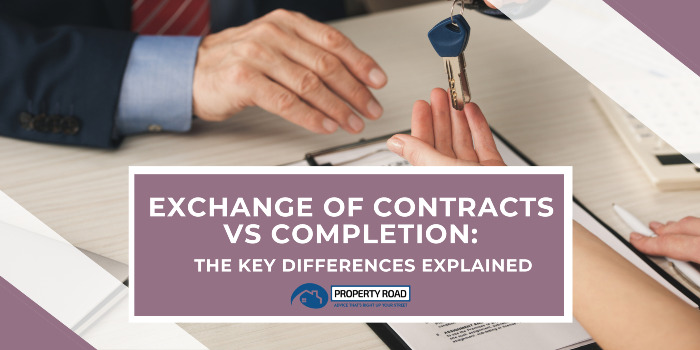There are many different stages to buying and selling a property, and it’s a complex legal process. However, there’s one stage we ultimately care about: getting past that finish line.
However, there can be some confusion about where exactly that finish line is. Usually, the exchange of contracts is often mistaken as the final stage of selling or buying. Although the exchange of contracts is a big milestone – it’s not actually the end. That stage is called completion.
In this guide, we’ll go through the difference between the exchange of contracts vs completion. We’ll also delve deeper into how each stage works and how you can help ensure smooth sailing to that finish line.
Exchange of contracts vs completion: the quick version
Differentiating the exchange of contracts vs completion can be confusing, especially when both terms are used interchangeably.
All you have to remember is that the exchange of contracts is where buying/selling a property becomes legally binding. It’s basically the point where both parties agree on the sale and are held accountable to ensure it all goes to plan.
When looking at the big picture, the exchange of contracts is the 9th step in selling a home.
And between the exchange of contracts and completion, completion is the moment when the property sale is legally finalised.
This is the finishing point, taking place on an agreed date, and it is finished by handing over the keys. It’s the 10th and final step that you must complete when buying or selling a property.
| Exchange of contracts | The point where a property transaction becomes legally binding. |
| Completion | The point where the transaction is legally finalised, and new owners receive the keys. |
Between the exchange of contracts vs completion, the exchange of contracts is where the property sale is agreed on paper, and you legally commit to it. Completion is the day it officially goes through, and the keys are literally passed over.
What is the exchange of contracts?
As briefly explored, the exchange of contracts is where both sides sign the paperwork and commit to the property sale.
This process is legally binding – which means it acts like a point of no return. By exchanging, both sides agree that the sale will happen as agreed.
It’s also the point that you agree to a completion date, and confirm that all legal paperwork is ready (or will be ready for the completion date) for the sale.
The exchange of contracts is carried out by solicitors. Years ago, this meant that solicitors had to physically meet up and exchange printed contracts (hence the name).
However, thanks to technology, this can now all be done on the phone.
Here’s what happens during the exchange of contracts process:
- Both the buyer and seller sign a contract agreeing to the sale of the property.
- The seller also signs a transfer of title deed (TR1 form), while the buyer ensures that they have cleared deposit funds and a mortgage offer. In some cases, they will also need to have a building insurance policy.
- The buyer’s solicitor will contact the seller’s solicitor, informing them that they have the signed contracts, deposit funds and the mortgage offer. They will agree to the terms of sale and offer a completion date.
- They will then provide a release time. This is a time frame where all solicitors have to agree on the terms and completion date by.
- The seller’s solicitor will then agree to a completion date and the process is complete!
This process must be completed within the release time. If there’s no agreement in that time, the whole process needs to be started again the next day until all sides fully agree.
Most completion dates are set for Friday. This is because it’s designed to give people working traditional full-time jobs an entire weekend to move into their new property, without taking more than an afternoon or day off work.
Other days can be arranged – but you might find that Fridays are accepted more easily.
How does the exchange of contracts work in a chain?
When in a chain, the exchange of contracts can be a little more complicated. However, it follows the same process.
The only difference is that more solicitors are involved, and the process can’t be completed until every side agrees to the terms and completion date.
For example:
- Jane is buying her first home. She’s moving into a nice little 2-bedroom terraced house that Joel is selling.
- Joel is also buying a home, moving into a bigger place ready for a new baby with his wife. He’ll be moving into a 3-bed semi being sold by Cameron.
- Cameron is also buying a new home, and moving towns for a new career opportunity. He’s moving into a cosy little city flat owned by Sally.
- Sally is moving in with her partner. He already owns the home, so she is the last link in the chain.
In this case, the process looks like this:
- Jane’s solicitor contacts Joel’s, informing them they have Jane’s signed contracts, deposit funds and the mortgage offer. They set a release time of one day and propose a completion date of May 1st.
- Joel’s solicitor then contacts Cameron’s, informing them they have Joel’s signed contracts, deposit funds and the mortgage offer. They set a release time of one day and propose a completion date of May 1st.
- Cameron’s solicitor then contacts Sally’s, informing them they have Cameron’s signed contracts, deposit funds and the mortgage offer. They set a release time of one day and propose a completion date of May 1st.
- Sally’s solicitor agrees to the completion date of May 1st, and contacts Cameron’s solicitor.
- Cameron’s solicitor agrees to the completion date of May 1st, and contacts Joel’s solicitor.
- Joel’s solicitor agrees to the completion date of May 1st, and contacts Jane’s solicitor.
- The exchange of contracts is complete. Great job everyone!
This is also one reason why buying or selling a property without a chain can be easier and shorter (and why chain-free buyers have been dominating the UK housing market). The fewer links you have to go through, the easier it is to agree to and complete these processes.
What is completion?

Between the exchange of contracts vs completion, the latter is the final step in buying and selling a property. It’s when the keys are handed over and the property officially belongs to its new owner. It can be a very exciting day indeed.
The process of completion looks like this:
- The full purchase funds are paid.
- When the seller’s solicitor or conveyancer receives these funds, they will inform the buyer’s solicitor and selling agent that the sale has been completed.
- The seller has to vacate the property and hand over their keys (usually by 1pm that day).
- The buyer then collects the keys from the selling agent and is free to move in!
At completion, the buyer will also have to pay any Stamp Duty Land Tax due, while their conveyancer will have to register the new ownership with the Land Registry.
Other than that, the whole process is done. The buyer is now the proud owner of the property. If the sale is part of a chain, the process happens simultaneously for all parties.
Using the earlier chain example.
- The full purchase funds are paid for each property.
- Joel’s, Cameron’s, and Sally’s solicitors each confirm that they have received the funds and inform the relevant parties.
- Sally has until 1pm to vacate the cosy bungalow and hand over the keys.
- Cameron has until 1pm to vacate the 3-bed semi. He can then pick up the keys to Sally’s now empty bungalow.
- Joel has until 1pm to vacate the 2-bed terraced house. He can then pick up the keys to Cameron’s now empty 3-bed semi.
- Jane can pick up the keys to the now empty 2-bed terraced house after 1pm.
It’s a pretty smooth process once it’s all agreed.
How long does it take to go from exchange to completion?
On average, it takes between 1-2 weeks to go from the exchange of contracts to the completion date. During this time, both parties have time to book movers, pack boxes and ensure that all the paperwork is complete and accurate.
However, it can take longer to go from exchange to completion. For example, completion may happen a few months after the exchange for circumstances like:
- The buyer needs to give notice on a rental place or wait until a contract expires.
- The property is a new build that isn’t finished yet.
However, the exchange of contracts cannot be done without a completion date. So you will never be left waiting on this date – it’s a clear one for the calendar to prepare for!
For more information on how long it takes to sell a home, check out our in-depth guide here.
Exchanging contracts and completing on the same day
Is this possible? Yes, you can exchange contracts and complete on the same day.
However, it won’t be a recommended process for everyone as it can be pretty stressful. This is because there’s no guarantee that the process will be completed in one day – as it could be delayed by several factors.
For example, the paperwork might not be received in time, the funds might be delayed, there might be last-minute issues with mortgage agreements, etc.
If you’ve booked movers hoping to exchange and complete on the same day, this can be an expensive mistake if it doesn’t go through the way you wanted.
Things that can go wrong between exchange and completion

There are a few issues that could appear between an exchange of contracts vs completion. To help you prepare (just in case!), here’s what problems you could be facing.
1. One side backs out
This is a very rare occurrence, as an exchange of contracts is a legally binding agreement. This means that once the exchange of contracts is done, each side is contractually committed to completing.
To pull out after this stage would be a breach of contract, which will be met with financial penalties.
For example, if a buyer pulls out – they will forfeit their entire deposit. In addition, they may also be liable to pay interest on the balance of the completion funds.
If a seller pulls out, they are liable for any buyer costs, such as conveyancing or solicitor fees, as well as survey fees. Future agents may also be wary of working with you in the future.
Usually, a party pulling out of the contract is due to communication errors between parties.
2. Financial delays
Again, it’s a rare occurrence. But there could be a chance that funding falls through in the time between the exchange of contracts and competition.
This could be through an error with the mortgage lender, some unexpected costs that weren’t accounted for or in worse case scenarios, the buyer could have lost their job or source of income.
If you’re not too close to the completion date, it may be possible to arrange another mortgage agreement or source of funding in time. However, if this isn’t possible, you won’t be able to complete.
3. Legal issues
If any paperwork is wrong, the completion cannot happen until all the documentation is 100% correct.
4. Property issues
Any unexpected damage during final inspection can also slow down completion and harm the agreement between parties. For example, this could be anything from an unexpected leak to an appliance failure.
This would also cover events like a fire or flood in worst-case scenarios.
5. A broken chain

If you’re part of a long chain and any of the links fail, your completion might also be affected. This is one of the more frustrating problems to encounter as there’s nothing your side can do about it.
We had a near miss when we bought our current home. On the morning of completion day our buyer contacted us to say that his removal company had cancelled, because one of their team members had been tested positive for COVID-19.
The rules at the time meant that the whole team had to self-isolate, so they couldn’t move our buyer. For us, this was a scary moment, because our removal company was already packing up our stuff, and we didn’t know what would happen.
After contacting our solicitor, we were a bit reassured.
He said that these things do happen, but most of the time it gets sorted and everyone moves. Although we knew that we would be financially compensated if moving day would be cancelled, we didn’t want this to happen.
In the end, all was fine, as our buyer found another moving company. But for a few hours we were biting our nails, not knowing what would happen and if we could move.
This shows that things can go wrong between exchange and completion, so don’t count your chickens before you have the key to your new home in your hands.
Exchange of contracts vs completion: the finishing parts of a sale
To recap the highlights between the exchange of contracts vs completion, remember that both are the final stages of a sale.
- Exchange of contracts is where both parties legally commit to the sale – and agree on a completion date.
- Completion is when the final sale is finished and the keys are exchanged.
Typically, the time between the two stages is 1-2 weeks, although it can take months depending on the circumstances of the sale.
To help make the property sale go through smoothly, find out more about the 10 steps to selling a home in the UK, and make sure that you stay up to date with Property Road for more advice, tips and guides.




